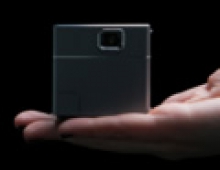
ITC Rules Partially Against Kodak in Apple Dispute
Photography company Eastman Kodak received a mixed ruling on its patent infringement suit against Apple and BlackBerry maker Research in Motion.
The U.S. International Trade Commission issued a verdict Thursday in Kodak's
high-stakes patent-infringement dispute with the makers of the iPhone and
BlackBerry phones.
The federal agency found limited patent infringement. It also sent some matters back to the administrative law judge for further review, and Kodak could still prevail in the remaining claims.
The commission said that Kodak had waived its rights to pursue that claim with flash photos. It asked the judge to decide whether Kodak had waived the rights for non-flash photos as well.
However, it did not rule on any penalties.
In support of Kodak, the Commission modified the following key findings:
- Kodak appealed the meaning of the patent term "at least three different colors." The Commission agreed with Kodak that all of Apple and RIM's accused phones infringe this term.
- Kodak appealed the meaning of the patent terms "motion processor" and "still processor." The Commission revised the judge?s interpretations and instructed him to make a new recommendation based on the revision.
- Kodak appealed the meaning of the patent term "initiating capture." The Commission agreed with Kodak that RIM's accused phones and certain Apple phones infringe this term. With respect to other Apple phones, the Commission instructed the judge to reconsider his recommendation.
- Kodak appealed the judge's invalidity ruling. The Commission sent the issue back to the judge for reconsideration in view of the revised meaning of the patent terms.
- The Commission affirmed other determinations favorable to Kodak, including the enforceability of the patent, and the existence of domestic industry.
"We are gratified that the Commission has decided to modify in our favor the judge?s initial recommendation," said Laura G. Quatela, General Counsel, Chief Intellectual Property Officer and Senior Vice President, Eastman Kodak Company. "As we have said from the start, we remain extremely confident this case will ultimately conclude in Kodak's favor."
Apple and RIM have not yet commented on the ITC's decicion.
A revised decision is expected no earlier than Aug. 30 after the judge rules on pending matters.
The patent at issue relates to a method invented by Kodak for previewing images. This particular patent was validated by the U.S. Patent and Trademark Office in December 2010. Kodak has licensed its imaging patents, including the one at issue in the case currently before the ITC, to numerous technology companies including: LG, MEI/Panasonic, Motorola, Nokia, Olympus, Samsung, Sanyo, Sharp, Sony, and Sony Ericsson.
Kodak initially filed an ITC complaint against Apple and RIM on January 14, 2010, asserting that Apple?s iPhones and RIM's camera-enabled Blackberry devices infringe a Kodak patent covering technology related to a method for previewing images. Kodak also has federal court actions pending against RIM and Apple in the Northern District of Texas and in the Western District of New York, where this same issue and additional infringement claims will be adjudicated. Kodak is proceeding with these actions, with the Texas case scheduled to begin on August 1, 2011.
The federal agency found limited patent infringement. It also sent some matters back to the administrative law judge for further review, and Kodak could still prevail in the remaining claims.
The commission said that Kodak had waived its rights to pursue that claim with flash photos. It asked the judge to decide whether Kodak had waived the rights for non-flash photos as well.
However, it did not rule on any penalties.
In support of Kodak, the Commission modified the following key findings:
- Kodak appealed the meaning of the patent term "at least three different colors." The Commission agreed with Kodak that all of Apple and RIM's accused phones infringe this term.
- Kodak appealed the meaning of the patent terms "motion processor" and "still processor." The Commission revised the judge?s interpretations and instructed him to make a new recommendation based on the revision.
- Kodak appealed the meaning of the patent term "initiating capture." The Commission agreed with Kodak that RIM's accused phones and certain Apple phones infringe this term. With respect to other Apple phones, the Commission instructed the judge to reconsider his recommendation.
- Kodak appealed the judge's invalidity ruling. The Commission sent the issue back to the judge for reconsideration in view of the revised meaning of the patent terms.
- The Commission affirmed other determinations favorable to Kodak, including the enforceability of the patent, and the existence of domestic industry.
"We are gratified that the Commission has decided to modify in our favor the judge?s initial recommendation," said Laura G. Quatela, General Counsel, Chief Intellectual Property Officer and Senior Vice President, Eastman Kodak Company. "As we have said from the start, we remain extremely confident this case will ultimately conclude in Kodak's favor."
Apple and RIM have not yet commented on the ITC's decicion.
A revised decision is expected no earlier than Aug. 30 after the judge rules on pending matters.
The patent at issue relates to a method invented by Kodak for previewing images. This particular patent was validated by the U.S. Patent and Trademark Office in December 2010. Kodak has licensed its imaging patents, including the one at issue in the case currently before the ITC, to numerous technology companies including: LG, MEI/Panasonic, Motorola, Nokia, Olympus, Samsung, Sanyo, Sharp, Sony, and Sony Ericsson.
Kodak initially filed an ITC complaint against Apple and RIM on January 14, 2010, asserting that Apple?s iPhones and RIM's camera-enabled Blackberry devices infringe a Kodak patent covering technology related to a method for previewing images. Kodak also has federal court actions pending against RIM and Apple in the Northern District of Texas and in the Western District of New York, where this same issue and additional infringement claims will be adjudicated. Kodak is proceeding with these actions, with the Texas case scheduled to begin on August 1, 2011.


















